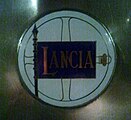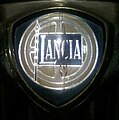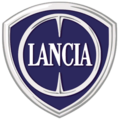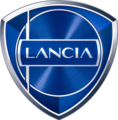 | |
 Palazzo Lancia, former company headquarters Palazzo Lancia, former company headquarters | |
| Company type | Subsidiary |
|---|---|
| Industry | Automotive |
| Founded | 27 November 1906; 118 years ago (1906-11-27) |
| Founder | Vincenzo Lancia |
| Headquarters | Turin, Italy |
| Area served | Italy |
| Key people | John Elkann (Chairman, Stellantis) Luca Napolitano (CEO) |
| Products | Automobiles |
| Production output | 43,076 (2020) |
| Parent | Stellantis Europe |
| Website | www |
Lancia Automobiles S.p.A. (Italian: [ˈlantʃa]) is an Italian car manufacturer and a subsidiary of Stellantis Europe, which is the European subsidiary of Stellantis. The present legal entity of Lancia was formed in January 2007 when its corporate parent reorganised its businesses, but its history is traced back to Lancia & C., a manufacturing concern founded in 1906 in Torino by Vincenzo Lancia (1881–1937) and Claudio Fogolin. It became part of Fiat in 1969.
The brand is known for its strong rallying heritage, and technical innovations such as the unibody chassis of the 1922 Lambda and the five-speed gearbox introduced in the 1948 Ardea. Despite not competing in the World Rally Championship since 1992, Lancia still holds more Manufacturers' Championships than any other brand.
Sales of Lancia-branded vehicles declined from over 300,000 annual units sold in 1990 to less than 100,000 by 2010. After corporate parent Fiat acquired a stake in Chrysler in 2009, the Lancia brand portfolio was modified to include rebadged Chrysler products, for sale in most European markets. In the United Kingdom and Ireland however, Lancias were rebadged as Chryslers. As sales continued to drop the Lancia-badged Chryslers were no longer offered after 2015. Since then, the company's only product has been the Lancia Ypsilon, and sales outside of Italy ended in 2017. Despite Lancia's much smaller brand presence, the Ypsilon continues to be popular in Italy; in fact it was the second best-selling car there in 2019.
The newly merged Franco-Italian-American company Stellantis stated that it would try to revive Italy's Lancia, with the move also suggesting there would be more than one model for the brand, as well as sales outside of Italy for the first time in years.
History
Foundation and early years

Lancia & C. Fabbrica Automobili was founded on 27 November 1906 in Turin by Fiat racing drivers, Vincenzo Lancia and his friend, Claudio Fogolin. The first car manufactured by Lancia was the "Tipo 51" or "12 HP" (later called "Alfa"), which remained in production from 1907 to 1908. It had a small four-cylinder engine with a power output of 28 PS (21 kW; 28 hp).
In 1910, Lancia components were exported to the United States where they were assembled and sold as SGVs by the SGV Company. In 1915, Lancia also manufactured its first truck, the Jota, that continued as a dedicated series. In 1937, Vincenzo died of a heart attack. His wife, Adele Miglietti Lancia, and his son, Gianni Lancia, took over control of the company. They persuaded Vittorio Jano to join as an engineer. Jano had already made a name for himself by designing various Alfa Romeo models, including some of its most successful race cars ever such as the 6C, P2 and P3.
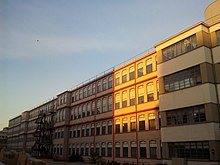
Lancia is renowned in the automotive world for introducing cars with numerous innovations. These include the Theta of 1913, which was the first European production car to feature a complete electrical system as standard equipment. Lancia's first car adopting a monocoque chassis, the Lambda produced from 1922 to 1931, featured 'Sliding Pillar' independent front suspension that incorporated the spring and hydraulic damper into a single unit (a feature that would be employed in subsequent Lancias, up to the Appia that was replaced in 1963). In 1948, the first 5-speed gearbox was fitted to a production car (Series 3 Ardea). Lancia premiered the first full-production V6 engine, in the 1950 Aurelia, after earlier industry-leading experiments with V8 and V12 engine configurations. It was also the first manufacturer to produce a V4 engine. Other innovations involved the use of independent suspension in production cars (in an era where live axles were common practice for both the front and rear axles of a car), and rear transaxles, which were first fitted to the Aurelia and Flaminia range. This drive for innovation, constant quest for excellence, fixation of quality, complex construction processes and antiquated production machinery meant that all cars essentially had to be hand-made. With little commonality between the various models, the cost of production continued to rise, while flat demand eventually affected Lancia's viability.
Gianni Lancia, a graduate engineer, was president of Lancia from 1947 to 1955. In 1956, the Pesenti family took control, with Carlo Pesenti in charge of the company.
1969 to 2021

Fiat launched a take-over bid in October 1969. It was accepted by Lancia as the company was losing significant sums of money, with losses in 1969 being £20 million. This was not the end of the distinctive Lancia marque, and new models in the 1970s such as the Stratos, Gamma and Beta proved that Fiat wished to preserve the image of the brand it had acquired. Autobianchi, bought by Fiat Group just a year before, was put under the control of Lancia.
During the 1970s and 1980s, Lancia had great success in rallying, winning many World Rally Championships.
During the 1980s, the company cooperated with Saab Automobile, with the Lancia Delta being sold as the Saab 600 in Sweden. The 1985 Lancia Thema also shared a platform with the Saab 9000, Fiat Croma and the Alfa Romeo 164. During the 1990s, all models were closely related to other Fiat models.
Starting from 1 February 2007, Fiat's automotive operations were reorganised. Fiat Auto became Fiat Group Automobiles S.p.A., Fiat S.p.A.'s branch handling mainstream automotive production. Simultaneously the current company, Lancia Automobiles S.p.A., was created from the pre-existing brand, and controlled 100% by FCA. In 2011, Lancia moved in another direction and added new models manufactured by Chrysler and sold under the Lancia badge in many European markets, such as the 300 (named Thema), 200 Convertible (as Flavia) and Voyager. Conversely, Lancia-built models began to be sold in right-hand drive markets under the Chrysler badge.
In 2015 Lancia's parent company Fiat Group Automobiles S.p.A. became FCA Italy S.p.A., reflecting the earlier incorporation of Fiat S.p.A. into Fiat Chrysler Automobiles.
After 2015, all models produced by Chrysler were discontinued in the European market. Since then, the Lancia brand has remained alive, only by continuing to manufacture and sell the Ypsilon - which received another slight facelift in 2020 - exclusively in the Italian market.
Since 2021 – Relaunch under Stellantis
Despite doubts about the brand's future following the completion of the Stellantis merger in 2021, Lancia was made part of a joint group with sister companies Alfa Romeo and DS Automobiles, to develop new premium models for the 2024 model year. As part of Stellantis' recovery plan for Lancia, Luca Napolitano was appointed the car maker's CEO, and Jean-Pierre Ploué its chief designer.
Three new electric models were announced in June 2021: a new subcompact car - which became the fourth generation of Ypsilon; a compact crossover (codenamed L74) - confirmed later in April 2023 as a five-door fastback CUV named Gamma, scheduled for a 2026 release; and a compact hatchback, likely to be a new Delta.

On November 28, 2022, Luca Napolitano laid the cornerstone of Lancia's "renaissance" by revealing a new logo and introducing the new Pu+Ra (Pure + Radical) Design language - through a sculpture called Pu+Ra Zero. Inspired by historic models such as the Aurelia, Flaminia, Delta and the 1970 Stratos Zero concept car, future electric models will be adorned by both organic lines and geometric shapes at the same time. The iconic calice grille was reinterpreted as a new Y-shaped LED light signature, with the new wordmark above them, instead of the shield. At the rear, round taillights pays homage directly to the Stratos sports car. All these design shapes were later applied into a fully-functional concept car: the Lancia Pu+Ra HPE Concept presented on 15 April 2023 in Milan.
On 12 December 2023, a prototype of the fourth generation of Ypsilon was found at the deep of a canal in the Montbeliard region, France, close to a Stellantis' plant in Sochaux; unveiling its final design few months before the official unveil. The model had been presumed stolen during development testing rides before the sinking.
On 14 February 2024, Lancia officially launches the fourth generation of Ypsilon, first under a limited production edition called Ypsilon Edizione Limitata Cassina, codeveloped between Lancia and Italian high-end furniture manufacturer Cassina S.p.A.. Production of the model is capped at 1,906 units, the amount referencing Lancia's foundation in 1906.
The Lancia Ypsilon dominated the Italian market in the first months of 2024, recording exceptional numbers for the brand. Concluding the first quarter with 12,923 units sold, up 16.4% compared to the same period in 2023.
In May 2024, Lancia announced the revival of the HF performance division, unveiling an all-new Ypsilon HF version, to be launched in May 2025, alongside a Rally4 version of the same model, signaling an (initially limited) return to rally championships.
As of July 2024, Lancia Ypsilon closed the first half of 2024 with 24,709 units sold, with a 3% increase in volumes and a market share of 2.8%, in line with last year's performance, confirming itself as one of the best-selling cars in its segment. On July 18, 2024, the first new Lancia Ypsilon is finally delivered. As of August 2024, the new Lancia Ypsilon sold in the Italian market 1.362. As of September 2024, the new Lancia Ypsilon sold in the Italian market 1.055. While in October 2024 the data further decreased with only 805 registered cars. As of November 2024. Lancia Ypsilon car sales are only 812 units in the Italian market.
However, it must be considered that the car has only been on the market for a few months in an unfavorable market context, dominated by the difficulties of the electric transition in addition to having only one model in production for Lancia. In this context, Lancia will close the year 2024, if massive incentives and tax breaks do not intervene with sales of approximately 30,000 units only for italian market. Among the positive factors to consider for 2024, the expansion of Lancia dealers on the European market and beyond, while in previous years it was only present on the Italian market, and the future expansion of the range with the new planned models of Lancia Gamma and Lancia Delta. Furthermore, Lancia's return to Rally competitions will certainly benefit sales and the relaunch of the brand.
Production models
- * As of 18 July 2024, Half-year data
| Year | Cars |
|---|---|
| 1990 | 300,087 |
| 1991 | 265,172 |
| 1992 | 223,127 |
| 1993 | 163,636 |
| 1994 | 163,535 |
| 1995 | 162,416 |
| 1996 | 159,251 |
| 1997 | 176,211 |
| 1998 | 175,215 |
| 1999 | 161,019 |
| 2000 | 170,348 |
| 2001 | 134,812 |
| 2002 | 110,529 |
| 2003 | 108,989 |
| 2004 | 118,201 |
| 2005 | 115,543 |
| 2006 | 122,956 |
| 2007 | 118,036 |
| 2008 | 113,307 |
| 2009 | 113,810 |
| 2010 | 97,757 |
| 2011 | 100,007 |
| 2012 | 98,733 |
| 2013 | 71,223 |
| 2014 | 69,835 |
| 2015 | 61,652 |
| 2016 | 67,059 |
| 2017 | 60,620 |
| 2018 | 48,555 |
| 2019 | 58,759 |
| 2020 | 43,033 |
| 2021 | 43,735 |
| 2022 | 40,991 |
| 2023 | 44,743 |
| 2024 | 24.710* |
Current car models
Lancia Ypsilon
Main article: Lancia Ypsilon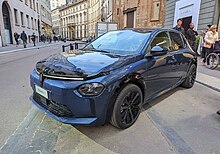
The Ypsilon is a premium 5-door supermini car produced since 2024. It is based on the CMP/e-CMP platform. It is a replacement for the Fiat 500 based model launched in 2011. It was previously available for sale in many European markets; however, since 2017, it has only been available in Italy. In the United Kingdom and Ireland it was previously sold as the Chrysler Ypsilon.
Although it is the only Lancia car in production and only for sale in Italy, the Ypsilon continues to be popular there; it was the second best-selling car in Italy in 2019.
Past car models
- Lancia 2000
- Lancia Appia
- Lancia Ardea
- Lancia Augusta
- Lancia Beta
- Lancia Dedra
- Lancia Delta
- Lancia Flavia
- Lancia Fulvia
- Lancia Gamma
- Lancia Kappa
- Lancia Lybra
- Lancia Montecarlo
- Lancia Prisma
- Lancia Thesis
- Lancia Trevi
Historical models
The Lancia Aurelia introduced the front engine rear transmission configuration later used by Ferrari, Alfa Romeo, Porsche, GM, Volvo and Maserati, as well as the V6 engine, which is now common. It had inboard rear brakes, an important way of reducing un-sprung weight.
The Lancia Stratos was a successful rally car during the 1970s, and helped the company to improve its sporting credentials.
Chrysler-derived models
The second generation Lancia Thema executive car (2011 – 2014) was a re-branded second generation Chrysler 300 unveiled in 2011 to replace the Thesis. It reused the name of the Italian made 1984–94 Thema saloon. It used to be available in various European markets, but for the United Kingdom and Ireland it was only sold as the Chrysler 300C. It was discontinued in 2015.
The Lancia Voyager was a large MPV unveiled in 2011, which was based on the Chrysler Town & Country. It was marketed in various European markets, but for the United Kingdom and Ireland it was only sold as the Chrysler Grand Voyager. It was discontinued in 2015.
Between 2012 and 2014, the Chrysler 200 Convertible was rebranded and marketed under the Lancia Flavia name. The Flavia was only available in left-hand drive markets, and thus not sold in the United Kingdom or Ireland.
Concept cars
See also: List of Lancia concept cars
Lancia has shown several concept cars to the public including the Flaminia Loratmo (1958), Stratos Zero (1970), the Megagamma by Italdesign Giugiaro and Sibilo by Bertone in 1978, Hit (1988) by Pininfarina, the Bertone-designed Kayak (1995), the Dialogos (1998) and Nea in 2000. The company showed the Granturismo Stilnovo and Fulvia concepts in 2003. Lancia has shown the PU+RA HPE concept in 2023 as part of brand renaissance strategy.
Special cars
In the end of 1960, Lancia made their first landaulet-limousine for the President of Italy, called the Lancia Flaminia 335 Presidenziale.
In 1989, Lancia made a limousine version of the Thema. 24 examples for Fiat-Group executives.
In 1999, Lancia made a one-off limousine version of the Kappa and at the 2004 Geneva Motor Show, Stola showed a limousine version of the Thesis.
Export markets
In January 2014, in an interview with La Repubblica, Fiat CEO Sergio Marchionne foreshadowed that Lancia would become an Italy–only brand, and focus only on the Ypsilon supermini range. However, in 2024, the brand began to be exported to other markets again.
France
In August 2024, Stellantis & You, a subsidiary of the Stellantis group dedicated to automobile distribution in Europe, has opened the very first Lancia point of sale located in La Défense, near Paris.
United States
While some models had been imported on a small scale during the 1950s to the 1960s, Lancias were sold in the United States from 1975. Sales were comparatively slow, and the range was withdrawn at the same time as Fiat in 1982.
In 2009, following Fiat's acquisition of a stake in United States–based Chrysler and part of Chrysler's restructuring plans, it was stated that Fiat plans for the Chrysler brand and Lancia to co–develop products, with some vehicles being shared. Olivier Francois, Lancia's CEO, took over as CEO of the Chrysler division in October 2009. Fiat also announced that, depending on the market, some Chrysler cars would be sold as Lancias and vice versa.
Francois' plans to re-establish the Chrysler brand as an upscale brand were somewhat muddied by the discontinuance of the Plymouth brand. At the 2010 Detroit Auto Show, a Chrysler-badged Lancia Delta was on display, but this did not result in sales in the United States, with proposals to instead modify an Alfa Romeo for sale by 2013.
United Kingdom
Lancia's reputation was significantly undermined in 1980, when defective Lancia Beta models, suffering from significant suspension sub-frame corrosion problems, were purchased back from owners by the company in a highly publicised campaign. These cars were later crushed. The brand never recovered from the damage inflicted during the Beta recall and, combined with a range of related factors (including poor residual values, which made their range uncompetitive), decided to withdraw from the United Kingdom (and other right-hand drive markets) in February 1994. The last model to be sold in the United Kingdom was the Delta, boosted by its rallying reputation, withdrawn from sale in 1995, although a small number of left-hand drive Lancia models have since reached the UK as personal imports.
After 1995, there were continuous rumours suggesting Lancia's return to the United Kingdom. In November 2005, What Car? reported rumours over the alleged return, to rival "affordable" premium makes, such as Saab and Volvo. In September 2006, What Car? reported that Lancia were returning to the United Kingdom. The relaunch date was set for August 2008. In April 2008, Car reported that Lancia had postponed the relaunch. In June 2009, Autocar reported that the relaunch of Lancia was now “very unlikely”.
These rumours were credible since Lancia models, by that time, shared common parts with Fiat and Alfa Romeo models that were imported, sold and maintained by an existing dealership network. The cost to reestablish the brand would therefore be minimal. In December 2008, however, Fiat cancelled relaunch plans, due to financial concerns coinciding with the global financial crisis, and the recession.
In 2011, Lancia Ypsilon and Delta models were eventually reintroduced to the United Kingdom, but were sold under the Chrysler marque. In January 2014, the slow-selling Delta model was dropped from this line-up. In March 2015, Fiat Group announced that the Chrysler brand would be discontinued in the United Kingdom in 2017, citing a desire to focus largely on the Jeep brand instead.
Japan
A small number of Lancia models were previously sold in Japan, such as Fulvia, Stratos and Delta. More recently, some models have been sold under the Chrysler brand, such as the Ypsilon.
Lancia in motorsport
Formula One
See also: Lancia Grand Prix results
After Vincenzo Lancia's son Gianni became director of the firm, it started to take part more frequently in motorsport, eventually deciding to build a Grand Prix car. Vittorio Jano was the new designer for Lancia and his Lancia D50 was entered into the 1954 Spanish Grand Prix, where Alberto Ascari took the pole position and drove the fastest lap. In the 1955 Monaco Grand Prix Ascari crashed into the harbour after missing a chicane. One week later Ascari was killed in an accident driving a Ferrari sports car at Monza. With Ascari's death and Lancia's financial problems the company withdrew from Grand Prix racing. Altogether Lancia took two victories and ten podiums in Formula One.
Remnants of the Lancia team were transferred to Scuderia Ferrari, where Juan Manuel Fangio won the 1956 championship with a Lancia-Ferrari car.
Rallying
See also: Lancia in rallying
Lancia has been very successful in motorsport over the years, and mostly in the arena of rallying. Prior to the forming of the World Rally Championship (WRC), Lancia took the final International Championship for Manufacturers title with the Fulvia in 1972. In the WRC, they remain the most statistically successful marque (despite having withdrawn at the end of the 1993 season), winning constructors' titles with the Stratos (1974, 1975 and 1976), the 037 (1983) and the Delta (six consecutive wins from 1987 to 1992). The Delta is also the most successful individual model designation ever to compete in rallying. All this gave Lancia a total of 11 Championships over the years and 15 European Championship from 1969 to 1992.
Juha Kankkunen and Miki Biasion both won two drivers' titles with the Delta. Among other drivers to take several World Rally Championship wins with Lancia were Markku Alén, Didier Auriol, Sandro Munari, Bernard Darniche, Walter Röhrl, Björn Waldegård and Henri Toivonen. The history of the brand in rallying is also tainted with tragedy, with deaths of Italian driver Attilio Bettega at the 1985 Tour de Corse in a Lancia 037 and then Finnish championship favourite Toivonen in a Lancia Delta S4 at the same rally exactly a year later. These deaths would eventually lead to the end of Group B rallying.
Sports car racing

In 1951 Mille Miglia, Lancia Aurelia B20 GT came second overall. .
In 1953, Umberto Maglioli won the Targa Florio at the wheel of the Lancia D20. The same year Lancia introduced the D24 sports racer, which was an evolution of D23 model, but rebodied as a spider by Pinin Farina. Its most significant victories were the 1953 Carrera Panamericana, the 1954 Mille Miglia and the 1954 Targa Florio.

During Lancia's dominance of rallying, the company also expanded into sports cars in the late 1970s until the mid-1980s. It first ran the Stratos HF in Group 4, and for a brief interlude with a rare Group 5 version. The car was replaced with the successful Beta Montecarlo Turbo winning the FIA's 1980 World Championship for Makes and 1981 World Endurance Championship for Makes and the 1980 Deutsche Rennsport Meisterschaft.

In 1982 the team moved up to Group 6 with the LC1 Spyder, followed by the Group C LC2 coupé which featured a Ferrari powerplant in 1983. The LC2 was a match for the standard-setting Porsche 956 in terms of raw speed, securing 13 pole positions over its lifetime; however, its results were hampered by poor reliability and fuel economy, and it only managed to win three European and World Endurance Championship races. The team's inability to compete against the dominant Porsche 956 and 962 sports cars led it to drop out of sportscar racing at the end of 1986 in order to concentrate on rallying, although private teams continued to enter LC2s with declining results until the early 1990s.
Titles
- 1979 World Championship for Makes (under 2-litre division)
- 1980 World Championship for Makes (overall)
- 1981 World Endurance Championship for Makes (overall)
- 1980 Deutsche Rennsport Meisterschaft
Commercial vehicles
Lancia produced a wide range of vans, trucks, buses and military vehicles from the beginning, forming Lancia Veicoli Industriali in 1912. Lancia slowly withdrew from the commercial sectors during the late 1960s and production of commercial vehicles ended in the early 1970s, shortly after Fiat's takeover of the company, with some models transferred to Iveco.

Light commercial vehicles
- 1958 Lancia Ardea Furgoncino (van), Cassone (pick-up)
- 1950 Lancia Beta
- 1953 Lancia Appia Furgoncino (van), Camioncino (pick-up)
- 1959 Lancia Jolly
- 1963 Lancia Superjolly
Heavy commercial vehicles





- 1915 Lancia Jota
- 1915 Lancia Djota
- 1921 Lancia Triota
- 1921 Lancia Tetrajota
- 1924 Lancia Pentajota
- 1926 Lancia Esajota
- 1927 Lancia Eptajota
- 1932 Lancia Ro
- 1935 Lancia Ro-Ro
- 1938 Lancia 3Ro
- 1943 Lancia Esaro
- 1941 Lancia E290 electric truck, 202 built (E290 & E291) (La Lancia 3rd Ed, p. 431, Wim Oude Weerink)
- 1947 Lancia 6Ro
- 1947 Lancia Esatau
- 1957 Lancia Esatau B
- 1959 Lancia Esadelta
- 1963 Lancia Esadelta B
- 1967 Lancia Esadelta C
- 1969 Lancia Esagamma
Buses
- 1919 Lancia Eptaiota
- 1920 Lancia Trijota (bus)
- 1922 Lancia Tetraiota
- 1925 Lancia Pentaiota
- 1927 Lancia Omicron
- 1934 Lancia Ro (bus)
- 1947 Lancia Esatau (bus)
- 1949 Lancia Esatau (bus) V11
- 1953 Lancia Esatau (bus) V81
- 1957 Lancia Esatau (bus) 703
- 1964 Lancia Esagamma (bus) 715/718
Trolleybuses
- 1951 Lancia Esatau Pistoiesi
- 1956 Lancia Esatau Piaggio Ansaldo
- 1961 Lancia Esatau V.11 (trolleybus)
- 1966 Lancia Diafa trolleybus
- 1967 Lancia Bimax
- 1968 Lancia Bimax F600
- 1968 Lancia Pistoiesi
- 1969 Lancia Menarini Monocar
- 1969 Lancia Esatau P Casaro
Military vehicles

- 1912 Lancia 1Z (light truck)
- 1912 Lancia 1ZM (armoured car)
- 1938 Lancia 3Ro (truck)
- 1942 Lancia Esaro (truck)
- 1942 Lancia Lince (armoured car)
- 1948 Lancia Esatau 6RoM (truck)
- 1951 Lancia CL51 (Z 20) (troop transporter)
- 1954 Lancia TL51 (Z 30) (truck)
- 1960 Lancia 506 (truck)
- 1975 Lancia ACL 75 (6611 M) (truck)
- 1990 Lancia ACL 90 (truck, later Iveco) (truck)
Tractor
- 1947 Lancia 3Ro (based on Fiat)
Other
- 2007 Lancia Bike
- 2009 Lancia di Lancia speedboat
Engines

- Lancia Flat-4 engine
- Lancia V4 engine
- Lancia V6 engine
- Lancia V8 engine
- Lancia Tipo 4
The company has also made industrial engines.
Logo
- 1907
From 1907 to 1910 Lancia cars didn't bear a true badge, but rather a brass plaque identifying the manufacturer (Lancia & C.) and chassis code; although some models did have a brass Lancia script on the grille.
- 1911
The original Lancia logo was designed by Count Carlo Biscaretti di Ruffia. In 1910 Vincenzo Lancia asked Biscaretti di Ruffia to design a badge for the company: the Count submitted six watercolour proposal sketches. Vincenzo Lancia chose a round one, composed by a blue lance and flag bearing a Lancia script ("Lancia" means "lance" in Italian) in gold, over a four-spoke steering wheel, with a hand throttle detail on the right spoke. The first car to bear the Lancia logo was the Gamma 20 HP in 1911.
- 1929
In 1929 the logo acquired its final layout: the previous round badge was superimposed on a blue shield in the shape of a Reuleaux triangle (as found in one of Biscaretti di Ruffia's six original proposals). Though first applied on the 1929 Dikappa, this badge was only used consistently starting with the 1936 Aprilia.
- 1957
Beginning with the 1957 Flaminia, Lancia cars switched from the traditional vertical split grille to a horizontal, full-width one. The logo was moved inside the grille opening, and changed to a more stylized chromed metal open-work design; shield and steering wheel became chrome frames, the only remaining enameled surface being the blue field of the flag. This new metal logo was used on most models with some exceptions, namely Zagato-bodied Lancia Fulvias and Flavias, the Lancia 2000 Berlina (which reprised the traditional upright grille and the round enameled badge) and the Stratos HF (whose ornaments lacked the triangular shield).
- 1974
In 1974 the badge was redesigned on Umberto Agnelli's request; it went back to a modernised silver, white and blue version of the 1929 design. Flag and lance were unified in a single shape and dispensed with the earlier minute detailing, the Lancia letters became all of the same size, and the steering wheel became also outlined in blue and lost the hand throttle detail. This logo debuted on the 1979 Lancia Delta, and made its way on the other models as they adopted the split grille introduced by the Delta. Though lightly revised in 2000 with the addition of a chrome shield surround, the 1974 logo was used through four decades, up to 2006.
- 2007
A redesigned logo, designed by Robilant Associati, was presented at the 2007 Geneva Motor Show—a couple of months after the creation of Lancia Automobiles. While the traditional chrome-framed blue shield has been retained and made three-dimensional, for the first time since 1911 lance and flag are absent; the steering wheel has been stylized into a chromed circle, from which two spikes converge towards the modern Lancia logotype in the centre.
- 2022
The current logo was unveiled in late 2022, as part of Lancia's newest design language dubbed Pu+Ra. The logo retains the colour scheme of the 2007 logo, while also reinstating and streamlining the flag, circle and lance theme of the 1957 logo.
Media and sponsorship
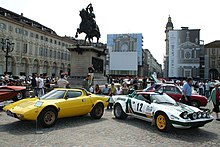
In 2009, the British motoring television show Top Gear suggested that Lancia had more 'great' models than any other car company. The presenters went on to test the Gamma Coupé, Fulvia Coupé, Aprilia, Montecarlo, Beta Coupé, HPE, Stratos, 037, Delta Integrale Evo II and Thema 8.32. They also stated during their review that Lancia made the best-looking cars, even though they are unreliable.
Lancia sponsored the Venice Film Festival for five years, ending in 2012, with the Lancia Thema used to transport stars to the festival. Lancia was sponsor of the ninth and eleventh World Summits of Nobel Peace Prize Laureates.
See also
- List of automobile manufacturers
- List of Formula One constructors
- List of Italian companies
- List of World Rally Championship Constructors' Champions
- Martini Racing
References
- Malan, Andrea (19 October 2019). "Lancia passes Fiat ownership landmark but no celebration for storied brand". Automotive News Europe. Retrieved 18 April 2020.
- ^ "Le auto più vendute in Italia nel 2019". 4 January 2020. Retrieved 12 January 2020.
- Michael Taylor (14 June 2021). "Stellantis Pulls Legendary Italian Brand Lancia Back From The Brink". Forbes.
- ^ Angel Sergeev (2021-11-09). "Lancia To Sell Cars Outside Of Italy Starting In 2024". Motor1.com.
- Luca Cifferi (2022-04-07). "Lancia to prepare for sales outside of Italy by naming country managers". Automotive News Europe.
- ^ "Stellantis aims for 50% of sales online at relaunched Lancia". Reuters. 2022-05-20.
- Vorgers, Marc. "Lancia history". classicargarage.com. Archived from the original on 5 September 2008. Retrieved 1 May 2008.
- "Car here negotiating with leading dealers". The Washington Times. October 25, 1910. p. 13. Retrieved June 12, 2015 – via Newspapers.com.

- "Innovation The First Models". lancia.com. Archived from the original on 25 February 2007. Retrieved 9 June 2012.
- 1980; page 2 of: www.ritzsite.nl/Lancia/02_LanciaCC.htm, accessdate: 14. June 2016
- "100 Years of Motoring". The Motor: 52. 25 May 1985. Retrieved 20 March 2018.
- Tatra87 (23 February 2018). "Automotive History: Italian Deadly Sins (Part 3) – The Many Sins Of Lancia". www.curbsideclassic.com. Retrieved 20 February 2019.
{{cite web}}: CS1 maint: numeric names: authors list (link) - "Lancia loss was £20m". The Times. 30 April 1970. p. 24.
- Raffaelli, Fabio (2012). Enciclopedia dell'Automobile (in Italian). Script edizioni. ISBN 978-8866147091.
- ^ "Fiat auto cambia nome - Sarà "Automobiles group"". lastampa.it. 24 January 2007. Retrieved 12 February 2015.
- Chen, Angela (2014-12-16). "Chrysler Group Changes Name to Mirror Parent Fiat". Wall Street Journal. ISSN 0099-9660. Retrieved 2021-03-10.
- Peter Sigal (2021-02-04). "Alfa Romeo, DS, Lancia start work on joint models". Autonews Europe. Archived from the original on 2021-02-04.
- Angel Sergeev (2021-01-20). "Lancia Becomes Premium Brand In Stellantis Era". Motor1.com.
- Jacob Oliva (2021-03-13). "Alfa Romeo, Lancia Will Have 'Greater Opportunities' Under Stellantis". Motor1.com.
- "Appointment of the Top Executive Team to steer Stellantis". Stellantis. 2021-01-19.
- Michael Taylor (2021-06-14). "Stellantis pulls legendary italian brand Lancia back from the brink". Forbes.
- Luca Cifferi (2022-03-26). "Opel, DS flagship electric cars will be built in Italy". Automotive News Europe.
- Staff and wire reports (2022-05-20). "Lancia bets on online sales in European expansion". Auto News Europe.
- Thanos Pappas (2023-04-17). "Lancia's Upcoming EV Flagship Will Be Called The Gamma". CarScoops.
- Ben Whitworth (2023-04-15). "Lancia Pu+Ra HPE concept: the brand's future design direction starts here". Car Magazine.
- Sebastian Bell (2023-10-19). "2026 Lancia Gamma Confirmed As A BMW 4 Series-Sized Flagship Electric Fastback". CarScoops.
- Luca Ciferri (2021-06-23). "Lancia's revival plan focuses on electrification, design, expansion outside Italy". Auto News. Archived from the original on 2021-06-23.
- "Lancia Pu+Ra Zero Concept Debuts As Preview Of New Styling Language". Motor1.com. 2022-11-28. Retrieved 2023-01-07.
- ^ Luca Ciferri (2022-11-28). "Lancia unveils new logo, design language ahead of relaunch". Automotive News Europe.
- "Exclusive: the design secrets of future Lancia models and the new Pu+Ra Design language". LIGNES/auto. Retrieved 2023-01-07.
- "Svelato il nome del modello in arrivo dopo la Ypsilon: sarà Gamma". quattroruote.it. quattroruote.it. 15 April 2023. Retrieved 17 April 2023.
- "Lancia, la nuova era è cominciata". quattroruote.it. quattroruote.it. 15 April 2023. Retrieved 17 April 2023.
- Sebastien Bell (2023-12-12). "2025 Lancia Ypsilon EV Gives New Meaning To Leak After Possibly Stolen Prototype Plunges Into A Canal". CarScoops.
- Chris Teague (2023-12-13). "A presumably stolen Lancia Ypsilon prototype is pulled from a canal in France". AutoBlog.
- McDee, Max (3 February 2024). "Lancia reveals a limited edition 2024 Ypsilon Cassina". ArenaEV. Retrieved 5 February 2024.
- "Lancia Ypsilon: record di vendite nel primo trimestre 2024". motorionline.com. motorionline.com. 9 April 2024. Retrieved 10 April 2024.
- ^ "Lancia Ypsilon da record nel primo semestre del 2024". media.stellantis.com. stellantis.com. Retrieved 27 July 2024.
- "Oggi viene consegnata la prima Nuova Lancia Ypsilon". media.stellantis.com. stellantis.com. Retrieved 27 July 2024.
- "Immatricolazioni di autovetture per marca – Agosto 2024". unrae.it. unrae.it. Retrieved 27 November 2024.
- "Immatricolazioni di autovetture per marca – Settembre 2024" (PDF). unrae.it. unrae.it. Retrieved 27 November 2024.
- "Immatricolazioni di autovetture per marca – Ottobre 2024". unrae.it. unrae.it. Retrieved 27 November 2024.
- "Immatricolazioni di autovetture per marca – Novembre 2024". unrae.it. unrae.it. Retrieved 3 December 2024.
- "La nuova Lancia Gamma prodotta nello stabilimento Stellantis di Melfi". stellantis.com. stellantis.com. Retrieved 27 November 2024.
- "Lancia apre il primo showroom a Parigi e Barcellona". stellantis.com. stellantis.com. Retrieved 27 November 2024.
- "Lancia e Sparco insieme per il ritorno nel mondo del Rally". stellantis.com. stellantis.com. Retrieved 27 November 2024.
- "Lancia production between 1990–2009". oica.net. Retrieved 14 October 2010.
- "L'AUTO 2018 - Sintesi Statistica UNRAE" (PDF). unrae.it. Retrieved 20 December 2019.
- "Le auto più vendute in Italia nel 2020". alvolante.it. alvolante.it. 13 January 2021. Retrieved 31 March 2023.
- "Lancia Ypsilon, nel 2021 è la più venduta d'Italia dopo la Panda". auto.it/. auto.it/. 5 January 2022. Retrieved 31 March 2023.
- "La Lancia Y conclude il 2022 con un record di vendite". corrieredellosport.it. corrieredellosport.it. 5 January 2023. Retrieved 31 March 2023.
- "Il 2022 è stato l'anno del Rinascimento del marchio Lancia". media.stellantis.com. stellantis.com. Retrieved 31 March 2023.
- "Lancia Ypsilon da record nel 2023". stellantis.com. Retrieved 15 January 2024.
- "Chrysler UK website". Chrysler.co.uk. Archived from the original on 19 October 2011. Retrieved 21 October 2011.
- "Chrysler 200 to be Lancia Flavia in Europe". Inautonews.com. 17 January 2011. Archived from the original on 2 January 2014. Retrieved 19 December 2015.
- "Lancia Nea". Car and Driver. September 2000. Retrieved 23 August 2013.
- "Lancia Fulvia is coming". Autocar. Retrieved 27 July 2012.
- "Marchionne: "Ecco il futuro della Fiat"". La Repubblica (in Italian). 9 January 2014. Retrieved 27 April 2015.
- "Le premier point de vente Lancia a ouvert à Paris".
- "Lancia, Chrysler to share products". leftlanenews.com. Archived from the original on 26 June 2015. Retrieved 29 November 2009.
- Gall, Jared (January 2010). "Chrysler Delta Concept - Auto Shows". Car and Driver. Archived from the original on 15 January 2010. Retrieved 11 January 2010.
- "Caught Testing: 2013 Chrysler 100 - Spy Shots". Road & Track. 6 February 2012. Archived from the original on 5 May 2012. Retrieved 27 July 2012.
- Hunston, Hugh (10 April 1980). "Lancia buy back rust-hit Betas". The Glasgow Herald. Retrieved 26 August 2013.
- English, Andrew (28 Jun 2011). "Chrysler Ypsilon review". The Daily Telegraph. Archived from the original on 2022-01-12. Retrieved 26 August 2013.
- "Lancia tipped for return to UK". What Car?. 29 November 2005. Retrieved 25 May 2015.
- "Lancia to re-enter UK in 2008". What Car?. 5 September 2006. Archived from the original on 25 May 2015. Retrieved 25 May 2015.
- Foxall, James (11 April 2008). "Lancia postpones UK launch". carmagazine.co.uk. Retrieved 25 May 2015.
- "Lancia UK launch 'very unlikely'". autocar.co.uk. 29 June 2009. Retrieved 19 April 2017.
- "Fiat cancels Lancia's UK return". What Car?. 8 December 2008. Retrieved 27 July 2012.
- "Chrysler brand to be axed in the UK in 2017". What Car?. 17 March 2015. Retrieved 25 May 2015.
- "Formula One timeline". atlasf1.autosport.com. Retrieved 27 June 2007.
- "Lancia Formula 1 Team". 4mula1.ro. Retrieved 27 June 2007.
- "Lancia D50". ddavid.com. Archived from the original on 2 July 2007. Retrieved 27 June 2007.
- "1951 ex-Mille Miglia, ex-Le Mans, Lancia Aurelia B20GT » Thornley Kelham". www.thornleykelham.com. Archived from the original on 5 August 2021. Retrieved 14 January 2019.
- ^ "Un nuovo marchio per le sfide del futuro". lanciapress.com (in Italian). Lancia Automobiles S.p.A. 6 March 2007. Retrieved 26 April 2015.
- "Top Gear Loves Lancia part 1". topgear.com. Archived from the original on 25 June 2014. Retrieved 26 November 2010.
- "Maserati to take over role of Lancia at Film Festival of Venice". Auto Edizione. 29 July 2013. Retrieved 23 August 2013.
Further reading
- Cole, Lance (2017). "Chapter 2: Lancia Lamentation". The Classic Car Adventure: Driving Through History on the Road to Nostalgia. Barnsley, England: Pen & Sword. ISBN 9781473896413.
External links
| Lancia | |||||||||||||
|---|---|---|---|---|---|---|---|---|---|---|---|---|---|
| A marque of Stellantis | |||||||||||||
| Passenger cars |
| ||||||||||||
| Buses | |||||||||||||
| Trucks | |||||||||||||
| Vans | |||||||||||||
| Military vehicles | |||||||||||||
| Motorsport |
| ||||||||||||
| People |
| ||||||||||||
| Technologies | |||||||||||||
| Museum |
| ||||||||||||
| Buildings | |||||||||||||
| Bike | |||||||||||||
| Boat | |||||||||||||
- Lancia
- Stellantis
- Car brands
- Turin motor companies
- Defunct bus manufacturers
- Defunct truck manufacturers
- Trolleybus manufacturers
- Vehicle manufacturing companies established in 1906
- Italian companies established in 1906
- Italian brands
- Italian auto racing teams
- Italian racecar constructors
- World Sportscar Championship teams
- Formula One constructors
- Formula One entrants
- Car manufacturers of Italy
- Luxury motor vehicle manufacturers
- Sports car manufacturers




